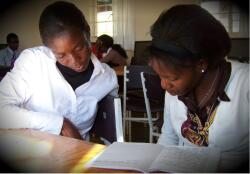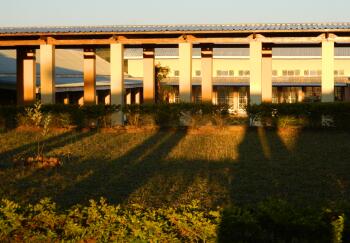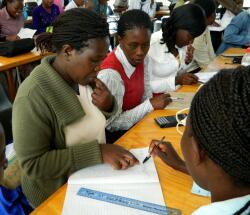A 100% Pass Rate in Malawi
 Speaking at the 5th annual Malawi Adventist University graduation on September 1, Malawi President Joyce Banda said that her government is committed to investing in "human capital as a priority" because she believes it is the "surest catalyst for achieving poverty eradication."
Speaking at the 5th annual Malawi Adventist University graduation on September 1, Malawi President Joyce Banda said that her government is committed to investing in "human capital as a priority" because she believes it is the "surest catalyst for achieving poverty eradication."
Planet Aid is expanding work to help President Banda fulfill her vision. Through DAPP Malawi, we provide support to four teacher-training colleges. In September, the colleges graduated 180 newly qualified teachers. This latest group of graduates brought the total number of new teachers trained at the colleges since the first opened in 2003 to 1,200. More than half of these new teachers are women.
A Perfect Score
To become a teacher in Malawi, students must pass the Malawi National Examination Board's (MANEB) rigorous assessment test. While student teachers graduating from public teacher training colleges in Malawi have a pass rate in the 90th percentile, the DAPP teacher training colleges have been able to achieve a 100% pass rate. This record is a testament to the dedication and skill of the student teachers and the ability of the program to inspire them to do their best.
 The DAPP colleges adhere to the many measurements involved in the assessment process, and work with MANEB to make sure that all students are evaluated fairly. At the end of their first year, the students have to take a one-week written exam, as do all student teachers nationwide. The week-long testing process involves 12 exams created by MANEB and evaluates progress in English, Chichewa (Malawi's national language), math, science, social science, life skills, religion, agriculture, foundation studies and expressive arts.
The DAPP colleges adhere to the many measurements involved in the assessment process, and work with MANEB to make sure that all students are evaluated fairly. At the end of their first year, the students have to take a one-week written exam, as do all student teachers nationwide. The week-long testing process involves 12 exams created by MANEB and evaluates progress in English, Chichewa (Malawi's national language), math, science, social science, life skills, religion, agriculture, foundation studies and expressive arts.
Classroom Assessments
Also as part of the DNS program, student teachers are immersed in the classroom as soon as they begin their program. While student teaching, the trainees are assessed no less than six times by the college during their first year. MANEB also visits the student teachers toward the end of their course of study and rates the students on everything from their classroom performance to the manner in which they conduct themselves in the community at large. In order to pass and complete the program, the students must pass the written exams and the in-class student teaching portion.
In a country where the youth literacy rate is 87% and the adult literacy rate is 75%, motivated teachers are making a difference and striving to meet the United Nations' primary education Millennium Development Goal by 2015. With the combination of the DNS philosophy and MANEB's comprehensive evaluation system, the DNS teacher training colleges are producing committed teachers in rural areas where they are most needed. The colleges each cooperate with between 10-15 primary schools and between 35-50 preschools in the neighboring region. They also conduct outreach to neighboring villages and are centers of learning, offering community lessons ranging from adult literacy to farming techniques and health. DAPP Malawi's teacher training program has received support from the USDA via Planet Aid through the Food for Progress Program.
Nations' primary education Millennium Development Goal by 2015. With the combination of the DNS philosophy and MANEB's comprehensive evaluation system, the DNS teacher training colleges are producing committed teachers in rural areas where they are most needed. The colleges each cooperate with between 10-15 primary schools and between 35-50 preschools in the neighboring region. They also conduct outreach to neighboring villages and are centers of learning, offering community lessons ranging from adult literacy to farming techniques and health. DAPP Malawi's teacher training program has received support from the USDA via Planet Aid through the Food for Progress Program.
For more information, visit our teacher training page or our sponsored DNS site.
